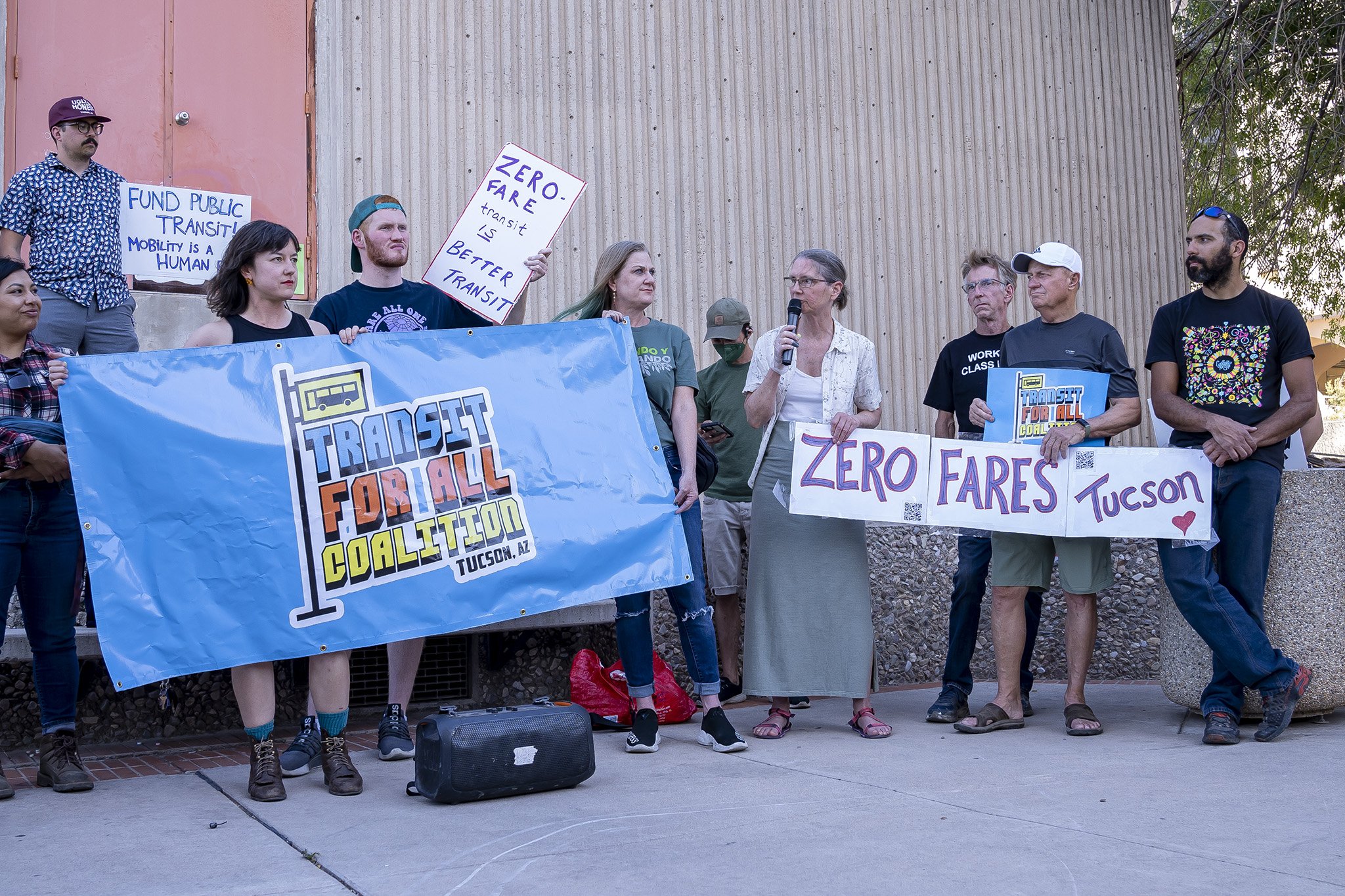State of Transit, Summer 2023
On May 9th, 2023, Tucson’s Mayor & Council voted to extend the city’s fare-free transit system indefinitely. The vote was a win for the Transit for All Coalition and other groups who have been organizing around the issue, and a sign that Tucson’s elected officials are taking note of extensive public support for free transportation (and its numerous benefits) voiced in the preceding months via rallies at city hall, public comments, letters and a petition with over 1,900 signatures.
While the vote guarantees free transit through the end of 2023 using a similar funding structure to that which has paid for the system since fares were lifted in 2020, it does not establish a dedicated funding source for transit service or improvements. There is a lot more to do to achieve the vision of equitable, accessible and convenient public transportation in Tucson. In order to carve a pathway to that vision, we need to understand where we really are with current policy, and where we can go from here.
Photo of May 9 TFAC Rally
Courtesy of Antonio Ramirez
What we know:
A motion to guarantee zero fares through December 2023 was proposed by Council Member Santa Cruz on May 9. Council member Kozachik amended the motion to specify a commitment to zero fares indefinitely, and require an affirmative vote to reinstate fares (which must be preceded by a Title VI analysis). This was accepted unanimously.
The continued operation of Sun Tran, Sun Link and Sun Van without fares through December 2023 is accounted for in the FY 23/24 City budget adopted on June 6, 2023. The estimated cost is $4.6 million, to be covered in part by City general funds and through partnerships with TMC and Visit Tucson, as well as by seeking other sources. General funds have been used to relieve transit fares (which paid for about one-tenth of system costs prior to 2020, with the rest subsidized by taxpayers) as part of an emergency response to the pandemic. Much of the resistance and reluctance to eliminating fares stems from concerns about how the transit system will be funded long-term.
For years, transit and mobility advocates have been pushing for a broader conversation about a separate, dedicated funding source in order to guarantee long-term investment in improving the transportation system. There are several ways this could be accomplished. Several Council Members are pushing for some of the City’s biggest transit users to come to the table and contribute funding, namely: the University of Arizona, TUSD, Pima Community College and some of Tucson’s major employers. Many of these partners had purchased large quantities of transit passes previous to elimination of fares. Other options have been proposed, such as creating a tax on hotels and/or rental vehicles to fund transportation through tourism, an industry which could benefit from the availability and convenience of public transportation.
With budget considerations in mind, the May 9th motion also mandated creation of “a stakeholder group that includes transit users, transit drivers and operators, and community members, to come up with long term solutions to funding and service improvements.” No decisions have yet been made about who this task force will include, or if it will be related to the City’s existing Transit Task Force. The City will also “continue to seek investment from partners like Pima Community College, the University of Arizona and Tucson school districts.”
What now?
Tucson’s is the largest transit system in the US to commit to fare-free service thus far. From letters of support submitted by individuals, businesses and organizations across Tucson, to input gathered in the Tucson Resilient Together Climate Action Plan, to recent actions taken by the Council: residents and government officials alike have demonstrated the political will and public interest in investing in free transportation for all.
We need to figure out a sustainable funding source to not only keep transit free, but improve the system and make it an easier choice for everyone to make. In order to achieve our equity and climate action goals, we need updates in the system’s frequency and reliability of service, accessibility across the city, community-centered rider safety, and comfort and convenience at transit stops.
LSA will continue to work with the Transit for All Coalition and other advocates and frequent riders to fight for better public transit (and mobility) for all. For those interested in joining the movement, opportunities for advocacy in our current moment include:
Staying informed of the task force’s development to ensure it is representative of transit riders
Continuing to show public support for free and improved public transportation (letters, comments; reach out to info@livingstreetsalliance.org if you have questions about how to get involved)
(Eventually) Voting for policies that create dedicated funding sources for transit
And of course, riding the bus or streetcar! Choosing to use public transit just once a week can reduce your carbon footprint significantly, as well as air pollution, health and safety hazards in Tucson.
Learn more:
Watch the May 9th M&C Study Session
Read the AZ Luminaria Story
Check out LSA’s Blog in Support of Free Transit


